- Home
- Algernon Blackwood
The Second Algernon Blackwood Megapack: 28 Classic Tales of the Supernatural
The Second Algernon Blackwood Megapack: 28 Classic Tales of the Supernatural Read online
COPYRIGHT INFO
The Second Algernon Blackwood Megapack is copyright © 2013 by Wildside Press LLC. All rights reserved. Cover art © Elena Schweitzer / Fotolia. For more information, contact the publisher.
* * * *
“Skeleton Lake” originally appeared in The Empty House and Other Ghost Stories (1906).
“Smith: An Episode in a Lodging-House” originally appeared in he Empty House and Other Ghost Stories (1906).
“A Suspicious Gift” originally appeared in The Empty House and Other Ghost Stories (1906).
“The Empty House” originally appeared in The Empty House and Other Ghost Stories (1906).
“The Listener” originally appeared in The Listener and Other Stories (1907).
“May Day Eve” originally appeared in The Listener and Other Stories (1907).
“Carlton’s Drive” originally appeared in The Lost Valley and Other Stories (1910).
“If the Cap Fits—” originally appeared in The Westminster Gazette, Feb. 23, 1914.
“The Man Who Played Upon the Leaf” originally appeared in Country Life, June 1910.
“Old Clothes” originally appeared in The Lost Valley and Other Stories (1910).
“The Eccentricity of Simon Parnacute” originally appeared in The Lost Valley and Other Stories (1910).
“The Golden Fly” originally appeared in The Eye-Witness, December 29, 1911.
“Transfer” originally appeared in Pan’s Garden, A Volume of Nature Stories (1912).
“Attic” originally appeared in The Westminster Gazette, April 20, 1912.
“The Glamour of the Snow” originally appeared in Pall Mall Magazine, December 1911.
“Sand” originally appeared in Pan’s Garden, A Volume of Nature Stories (1912).
“H.S.H.” originally appeared in H.S.H., February 1913
“A Desert Episode” originally appeared in Country Life, Oct. 1, 1914.
“By Water” originally appeared in The Westminster Gazette, April 19, 1914.
“The Goblin’s Collection” originally appeared in The Westminster Gazette, May 10, 1912.
“A Bit of Wood” originally appeared in Morning Post, April 29, 1914.
“An Egyptian Hornet” originally appeared in Reedy’s Mirror, March 1915.
“Cain’s Atonement” originally appeared in Land and Water, Nov. 20, 1915.
“The Other Wing” originally appeared in McBride’s, Nov. 1915.
“The Dance of Death” originally appeared in The Listener and Other Stories (1907).
“The Garden of Survival” originally appeared in 1918.
“A Case of Eavesdropping” originally appeared in Pall Mall Magazine (November 1906).
“Clairvoyance” originally appeared in The Eyewitness, (July, 1912).
A NOTE FROM THE PUBLISHER
This is our second Algernon Blackwood volume, and if you are starting this one before reading The First Algernon Blackwood Megapack, it won’t make a bit of difference, because they both contain great (but unrelated) short stories and can be read in any order. Some of Blackwood’s best work is in the first volume, so I hope you will pack that one up, too.
MEET ALGERNON BLACKWOOD
Algernon Blackwood (1869– 1951) was an English short story writer and novelist, one of the most prolific writers of ghost stories in the history of the genre. He was also a journalist and a broadcasting narrator. S. T. Joshi has stated that “his work is more consistently meritorious than any weird writer’s except Dunsany’s” and that his short story collection Incredible Adventures (1914) “may be the premier weird collection of this or any other century.”
Blackwood was born in Shooter’s Hill (today part of south-east London, but then part of northwest Kent) and educated at Wellington College. His father was a Post Office administrator who, according to Peter Penzoldt, “though not devoid of genuine good-heartedness, had appallingly narrow religious ideas.” Blackwood had a varied career, working as a dairy farmer in Canada, operating a hotel, as a newspaper reporter in New York City, bartender, model, journalist for the New York Times, private secretary, businessman, and violin teacher.
Throughout his adult life, he was an occasional essayist for various periodicals. In his late thirties, he moved back to England and started to write stories of the supernatural. He was very successful, writing at least ten original collections of short stories and eventually appearing on both radio and television to tell them. He also wrote fourteen novels, several children’s books, and a number of plays, most of which were produced but not published. He was an avid lover of nature and the outdoors, and many of his stories reflect this. To satisfy his interest in the supernatural, he joined the Ghost Club. He never married; according to his friends he was a loner but also cheerful company.
Jack Sullivan points out that “Blackwood’s life parallels his work more neatly than perhaps that of any other ghost story writer. Like his lonely but fundamentally optimistic protagonists, he was a combination of mystic and outdoorsman; when he wasn’t steeping himself in occultism, including Rosicrucianism and Buddhism, he was likely to be skiing or mountain climbing.” Blackwood was a member of one of the factions of the Hermetic Order of the Golden Dawn, as was his contemporary Arthur Machen.
His two best known stories are probably “The Willows” and “The Wendigo,” which lead off this collection. He would also often write stories for newspapers at short notice, with the result that he was uncertain exactly how many short stories he had written and there is no sure total. Though Blackwood wrote a number of horror stories, his most typical work seeks less to frighten than to induce a sense of awe. One good examples is the novel the Centaur. In correspondence with Peter Penzoldt, Blackwood wrote:
My fundamental interest, I suppose, is signs and proofs of other powers that lie hidden in us all; the extension, in other words, of human faculty. So many of my stories, therefore, deal with extension of consciousness; speculative and imaginative treatment of possibilities outside our normal range of consciousness.… Also, all that happens in our universe is natural; under Law; but an extension of our so limited normal consciousness can reveal new, extraordinary powers etc., and the word “supernatural” seems the best word for treating these in fiction. I believe it possible for our consciousness to change and grow, and that with this change we may become aware of a new universe. A “change” in consciousness, in its type, I mean, is something more than a mere extension of what we already possess and know.
—John Betancourt
Publisher, Wildside Press LLC
www.wildsidepress.com
ABOUT THE MEGAPACK SERIES
Over the last few years, our “Megapack” series of ebook anthologies has proved to be one of our most popular endeavors. (Maybe it helps that we sometimes offer them as premiums to our mailing list!) One question we keep getting asked is, “Who’s the editor?”
The Megapacks (except where specifically credited) are a group effort. Everyone at Wildside works on them. This includes John Betancourt, Mary Wickizer Burgess, Sam Cooper, Carla Coupe, Steve Coupe, Bonner Menking, Colin Azariah-Kribbs, Robert Reginald. A. E. Warren, and many of Wildside’s authors…who often suggest stories to include (and not just their own!).
A NOTE FOR KINDLE READERS
The Kindle versions of our Megapacks employ active tables of contents for easy navigation…please look for one before writing reviews on Amazon that complain about the lack! (They are sometimes at the ends of ebooks, depending on your reader.)
RECOMMEND A FAVORITE
STORY?
Do you know a great classic science fiction story, or have a favorite author whom you believe is perfect for the Megapack series? We’d love your suggestions! You can post them on our message board at http://movies.ning.com/forum (there is an area for Wildside Press comments).
Note: we only consider stories that have already been professionally published. This is not a market for new works.
TYPOS
Unfortunately, as hard as we try, a few typos do slip through. We update our ebooks periodically, so make sure you have the current version (or download a fresh copy if it’s been sitting in your ebook reader for months.) It may have already been updated.
If you spot a new typo, please let us know. We’ll fix it for everyone. You can email the publisher at [email protected] or use the message boards above.
THE MEGAPACK SERIES
MYSTERY
The Achmed Abdullah Megapack
The Charlie Chan Megapack
The Craig Kennedy Scientific Detective Megapack
The Detective Megapack
The Father Brown Megapack
The Jacques Futrelle Megapack
The Anna Katharine Green Mystery Megapack
The First Mystery Megapack
The Penny Parker Megapack
The Pulp Fiction Megapack
The Raffles Megapack
The Victorian Mystery Megapack
The Wilkie Collins Megapack
GENERAL INTEREST
The Adventure Megapack
The Baseball Megapack
The Cat Story Megapack
The Second Cat Story Megapack
The Christmas Megapack
The Second Christmas Megapack
The Classic American Short Stories Megapack, Vol. 1.
The Classic Humor Megapack
The Dog Story Megapack
The Doll Story Megapack
The Horse Story Megapack
The Military Megapack
SCIENCE FICTION & FANTASY
The Edward Bellamy Megapack
The First Reginald Bretnor Megapack
The Ray Cummings Megapack
The Philip K. Dick Megapack
The Randall Garrett Megapack
The Second Randall Garrett Megapack
The Edmond Hamilton Megapack
The Murray Leinster Megapack
The Second Murray Leinster Megapack
The Martian Megapack
The Andre Norton Megapack
The H. Beam Piper Megapack
The Pulp Fiction Megapack
The Mack Reynolds Megapack
The First Science Fiction Megapack
The Second Science Fiction Megapack
The Third Science Fiction Megapack
The Fourth Science Fiction Megapack
The Fifth Science Fiction Megapack
The Sixth Science Fiction Megapack
The Seventh Science Fiction Megapack
The Robert Sheckley Megapack
The Steampunk Megapack
The Time Travel Megapack
The Wizard of Oz Megapack
HORROR
The Achmed Abdullah Megapack
The E.F. Benson Megapack
The Second E.F. Benson Megapack
The Algernon Blackwood Megapack
The Second Algernon Blackwood Megapack
The Cthulhu Mythos Megapack
The Ghost Story Megapack
The Second Ghost Story Megapack
The Third Ghost Story Megapack
The Haunts & Horrors Megapack
The Horror Megapack
The M.R. James Megapack
The Macabre Megapack
The Second Macabre Megapack
The Mummy Megapack
The Vampire Megapack
The Werewolf Megapack
WESTERNS
The B.M. Bower Megapack
The Max Brand Megapack
The Buffalo Bill Megapack
The Cowboy Megapack
The Zane Grey Megapack
The Western Megapack
The Second Western Megapack
The Wizard of Oz Megapack
YOUNG ADULT
The Boys’ Adventure Megapack
The Dan Carter, Cub Scout Megapack
The Doll Story Megapack
The G.A. Henty Megapack
The Penny Parker Megapack
The Pinocchio Megapack
The Rover Boys Megapack
The Tom Corbett, Space Cadet Megapack
The Tom Swift Megapack
AUTHOR MEGAPACKS
The Achmed Abdullah Megapack
The Edward Bellamy Megapack
The Algernon Blackwood Megapack
The Second Algernon Blackwood Megapack
The B.M. Bower Megapack
The E.F. Benson Megapack
The Second E.F. Benson Megapack
The Max Brand Megapack
The First Reginald Bretnor Megapack
The Wilkie Collins Megapack
The Ray Cummings Megapack
The Guy de Maupassant Megapack
The Philip K. Dick Megapack
The Jacques Futrelle Megapack
The Randall Garrett Megapack
The Edmond Hamilton Megapack
The Second Randall Garrett Megapack
The Anna Katharine Green Megapack
The Zane Grey Megapack
The Dashiell Hammett Megapack
The M.R. James Megapack
The Selma Lagerlof Megapack
The Murray Leinster Megapack
The Second Murray Leinster Megapack
The George Barr McCutcheon Megapack
The Talbot Mundy Megapack
The Andre Norton Megapack
The H. Beam Piper Megapack
The Mack Reynolds Megapack
The Rafael Sabatini Megapack
The Saki Megapack
The Robert Sheckley Megapack
OTHER COLLECTIONS YOU MAY ENJOY
The Great Book of Wonder, by Lord Dunsany (it should have been called “The Lord Dunsany Megapack”)
The Wildside Book of Fantasy
The Wildside Book of Science Fiction
Yondering: the First Borgo Press Book of Science Fiction Stories
To the Stars—And Beyond! the Second Borgo Press Book of Science Fiction Stories
Once Upon a Future: the Third Borgo Press Book of Science Fiction Stories
Whodunit?—The First Borgo Press Book of Crime and Mystery Stories
More Whodunits—The Second Borgo Press Book of Crime and Mystery Stories
X is for Xmas: Christmas Mysteries
SKELETON LAKE
The utter loneliness of our moose-camp on Skeleton Lake had impressed us from the beginning—in the Quebec backwoods, five days by trail and canoe from civilisation—and perhaps the singular name contributed a little to the sensation of eeriness that made itself felt in the camp circle when once the sun was down and the late October mists began rising from the lake and winding their way in among the tree trunks.
For, in these regions, all names of lakes and hills and islands have their origin in some actual event, taking either the name of a chief participant, such as Smith’s Ridge, or claiming a place in the map by perpetuating some special feature of the journey or the scenery, such as Long Island, Deep Rapids, or Rainy Lake.
All names thus have their meaning and are usually pretty recently acquired, while the majority are self-explanatory and suggest human and pioneer relations. Skeleton Lake, therefore, was a name full of suggestion, and though none of us knew the origin or the story of its birth, we all were conscious of a certain lugubrious atmosphere that haunted its shores and islands, and but for the evidences of recent moose tracks in its neighbourhood we should probably have pitched our tents elsewhere.
For several hundred miles in any direction we knew of only one other party of whites. They had journeyed up on the train with us, getting in at North Bay, and hailing from Boston way.
A common goal and object had served by way of introduction. But the acquaintance had made little progress. This noisy, aggressive Yankee did not suit our fancy much as a possible neighbour, and it was only a slight intimacy between his chief guide, Jake the Swede, and one of our men that kept the thing going at all. They went into camp on Beaver Creek, fifty miles and more to the west of us.
But that was six weeks ago, and seemed as many months, for days and nights pass slowly in these solitudes and the scale of time changes wonderfully. Our men always seemed to know by instinct pretty well “whar them other fellows was movin’,” but in the interval no one had come across their trails, or once so much as heard their rifle shots.
Our little camp consisted of the professor, his wife, a splendid shot and keen woods-woman, and myself. We had a guide apiece, and hunted daily in pairs from before sunrise till dark.
It was our last evening in the woods, and the professor was lying in my little wedge tent, discussing the dangers of hunting alone in couples in this way. The flap of the tent hung back and let in fragrant odours of cooking over an open wood fire; everywhere there were bustle and preparation, and one canoe already lay packed with moose horns, her nose pointing southwards.
“If an accident happened to one of them,” he was saying, “the survivor’s story when he returned to camp would be entirely unsupported evidence, wouldn’t it? Because, you see—”
And he went on laying down the law after the manner of professors, until I became so bored that my attention began to wander to pictures and memories of the scenes we were just about to leave: Garden Lake, with its hundred islands; the rapids out of Round Pond; the countless vistas of forest, crimson and gold in the autumn sunshine; and the starlit nights we had spent watching in cold, cramped positions for the wary moose on lonely lakes among the hills. The hum of the professor’s voice in time grew more soothing. A nod or a grunt was all the reply he looked for. Fortunately, he loathed interruptions. I think I could almost have gone to sleep under his very nose; perhaps I did sleep for a brief interval.
Then it all came about so quickly, and the tragedy of it was so unexpected and painful, throwing our peaceful camp into momentary confusion, that now it all seems to have happened with the uncanny swiftness of a dream.
First, there was the abrupt ceasing of the droning voice, and then the running of quick little steps over the pine needles, and the confusion of men’s voices; and the next instant the professor’s wife was at the tent door, hatless, her face white, her hunting bloomers bagging at the wrong places, a rifle in her hand, and her words running into one another anyhow.

 Day and Night Stories
Day and Night Stories Four Weird Tales
Four Weird Tales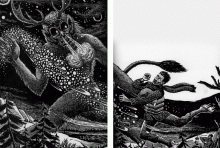 The Wendigo
The Wendigo Three More John Silence Stories
Three More John Silence Stories The Garden of Survival
The Garden of Survival The Extra Day
The Extra Day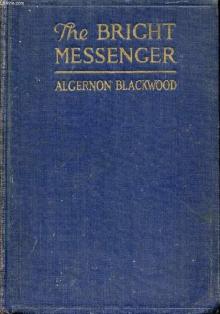 The Bright Messenger
The Bright Messenger Collected Works of Algernon Blackwood
Collected Works of Algernon Blackwood The Empty House
The Empty House Three John Silence Stories
Three John Silence Stories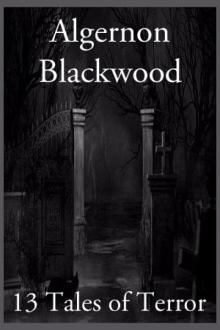 13 Tales of Terror
13 Tales of Terror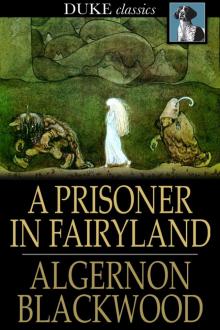 A Prisoner in Fairyland
A Prisoner in Fairyland Ancient Sorceries And Other Weird Stories
Ancient Sorceries And Other Weird Stories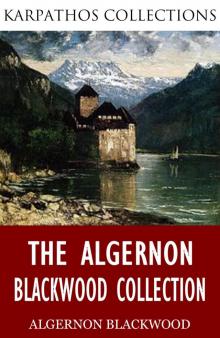 The Algernon Blackwood Collection
The Algernon Blackwood Collection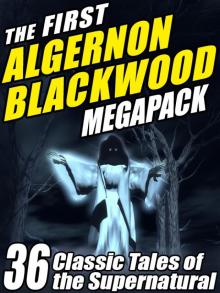 The First Algernon Blackwood Megapack: 36 Classic Tales of the Supernatural
The First Algernon Blackwood Megapack: 36 Classic Tales of the Supernatural John Silence, Physician Extraordinary
John Silence, Physician Extraordinary The Second Algernon Blackwood Megapack: 28 Classic Tales of the Supernatural
The Second Algernon Blackwood Megapack: 28 Classic Tales of the Supernatural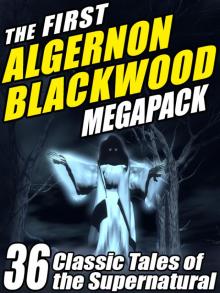 The First Algernon Blackwood Megapack
The First Algernon Blackwood Megapack The Second Algernon Blackwood Megapack
The Second Algernon Blackwood Megapack